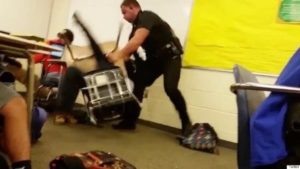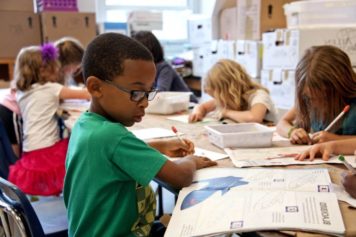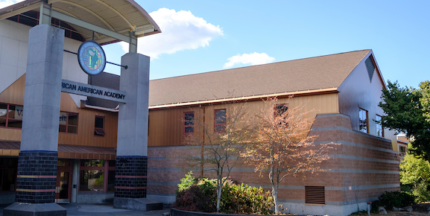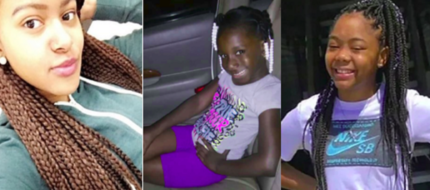The crisis at Spring Valley High School continues, providing evidence that the criminalization of Black children, and the plantation violence against Black girls and women, has not abated. This ongoing story highlights the lack of compassion towards Black people, and the callousness of the system towards Black children.
In October, Shakara, a student at Spring Valley High School in Columbia, South Carolina, was assaulted, pummeled and manhandled by a white sheriff’s deputy for reportedly not complying with orders to leave the classroom. The girl, who was yanked out of her desk, placed in a chokehold, flipped over in her chair and thrown to the floor by the officer, deemed this an unfair and unjust punishment. Although the cop who instigated this crime against the 16-year old girl was removed, the girl, and her classmate Niya Kenney, 18, who recorded the assault on her cellphone, still face misdemeanor charges.
As AP reported, a group of two dozen parents and activists gave a petition to the local prosecutor to drop the “disturbing schools” charges against the two students. The Richland 2 Black Parents Association says it has hundreds of thousands of signatures from people around the country, demanding that Solicitor Dan Johnson drop the charges. Johnson said he cannot make a decision until the FBI investigation against Richland County deputy Ben Fields, who was fired, is completed.
The activist groups who participated in the petition include ColorOfChange, the Alliance for Educational Justice and the Justice for the Spring Valley Two Coalition. As the Huffington Post reported, these groups are launching a social media campaign called #DroptheCharges to put pressure on Johnson, educate the public on this particular case, and eradicate school arrests.
….prosecutors….who criminalize black youth while failing to hold police accountable https://t.co/1sby27gmne #DroptheCharges
— ColorOfChange.org (@ColorOfChange) December 18, 2015
A young black girl gets tossd in foster care, tossd across the classrm floor, tossd 2 court & then 2 jail. That was fast. #DropTheCharges — KevinPatrickHodgkiss (@KPHodgkiss) December 18, 2015
A student stands up for her classmate as a police officer pulls & drags her out of her chair. She is arrested. #DropTheCharges
— KevinPatrickHodgkiss (@KPHodgkiss) December 18, 2015
Niya Kenny is a hero. She shouldn’t be facing charges for trying to stop the #AssaultatSpringValley #DroptheCharges https://t.co/ASsyyvOpbw — ColorOfChange.org (@ColorOfChange) December 17, 2015
Standing with @4EdJustice & partners. We demand #DropTheCharges #EndWarOnYouth from NC to SC we stand in solidarity pic.twitter.com/k8ugpWaKHC
— IgniteNC (@NC_Ignite) December 17, 2015
Filming a crime cannot be punished as a crime. #DropTheCharges #assaultatspringvalleyhigh https://t.co/qLSLsfXBii — debraj1121 (@debraj112) December 17, 2015
We stand in solidarity with Niya! You did the right thing, Sis! #DropTheCharges #AssaultAtSpringValleyHigh https://t.co/F3cB7NrOh1
— NU Tribe Magazine (@nutribemagazine) December 17, 2015
The larger issue is that throughout the country, particularly in the South, as Atlanta Blackstar has reported, Black children are disproportionately suspended and expelled. In fact, the very presence of Black children in school, not crime, causes the presence of police in schools. And these children face school discipline and arrest due to the perception by white teachers and officers that Black children are disruptive, violent, unintelligent and older than they are. And so the public schools become the entry point of Black children into the criminal justice system. This is how the school-to-prison pipeline is created.
“Sadly, what is happening to Shakara and Niya is no isolated incident. There is a racially biased system of school discipline across the country,” Efia Nwangaze of the Justice for the Spring Valley Two Coalition said in a statement. “Black girls are six times more likely to be punished — and more severely so than their white counterparts — and three times their black male counterparts in Richland.”
According to Nwangaze, the Richland School District suspends students at a rate 11 percent higher than the national average, with Black students far more likely to be suspended or expelled.
“These two young women have suffered enough without the justice system dragging out the process of eliminating these ridiculous charges,” said Rashad Robinson, executive director of ColorOfChange, in a statement, noting that Solicitor Dan Johnson should do the right thing. “By failing to take action, he has aligned himself with far too many prosecutors around the country who criminalize black youth while failing to hold police accountable.”
Meanwhile, the “disturbing school” charge can lead to a $1,000 fine and up to 90 days in jail in South Carolina. Under this law, it is forbidden for anyone “to interfere with or to disturb in any way or in any place the students or teachers of any school” or “to act in an obnoxious manner.” According to Reuters, the statute, which was enacted in 1962, the same year the Confederate flag was raised over the state house, is under fire for being too broad. While 18 other states have a similar law, the Palmetto State has a more sweeping definition of the offense.
“A child simply looking at a phone is enough to bring in law enforcement,” said State Representative Joe Neal (D). “Any infraction perceived by any authority in the school can be covered.”
During the 2013-2014 school year, 1,189 students were referred to the state juvenile authorities for disturbing school, not including teenagers charged as adults, according to Reuters. Behind simple assault and shoplifting, it was the third most frequent offense that resulted in referrals, according to the South Carolina Department of Juvenile Justice.
From Sandra Bland to the rape victims of Oklahoma City police officer Daniel Holtzclaw, Black women and girls face violence and death on a daily basis, often without attention or outrage. And from Bree Newsome, who climbed the flagpole to remove the Confederate flag in South Carolina, to the Mizzou football team who stood up against racism, to student protesters in Baltimore, those young people who dare to illuminate the injustices against Black people face criminal sanction. And too often, society blames the victims for their own victimization, because they had it coming by virtue of their high melanin content.
We must remember the trauma faced by Shakara, who became injured by agents of the state, officials to whom her care was entrusted. This is the type of treatment one would expect from the slave patrols who roamed the South Carolina plantations more than 150 years ago, and yet it seems those patrols remain.



